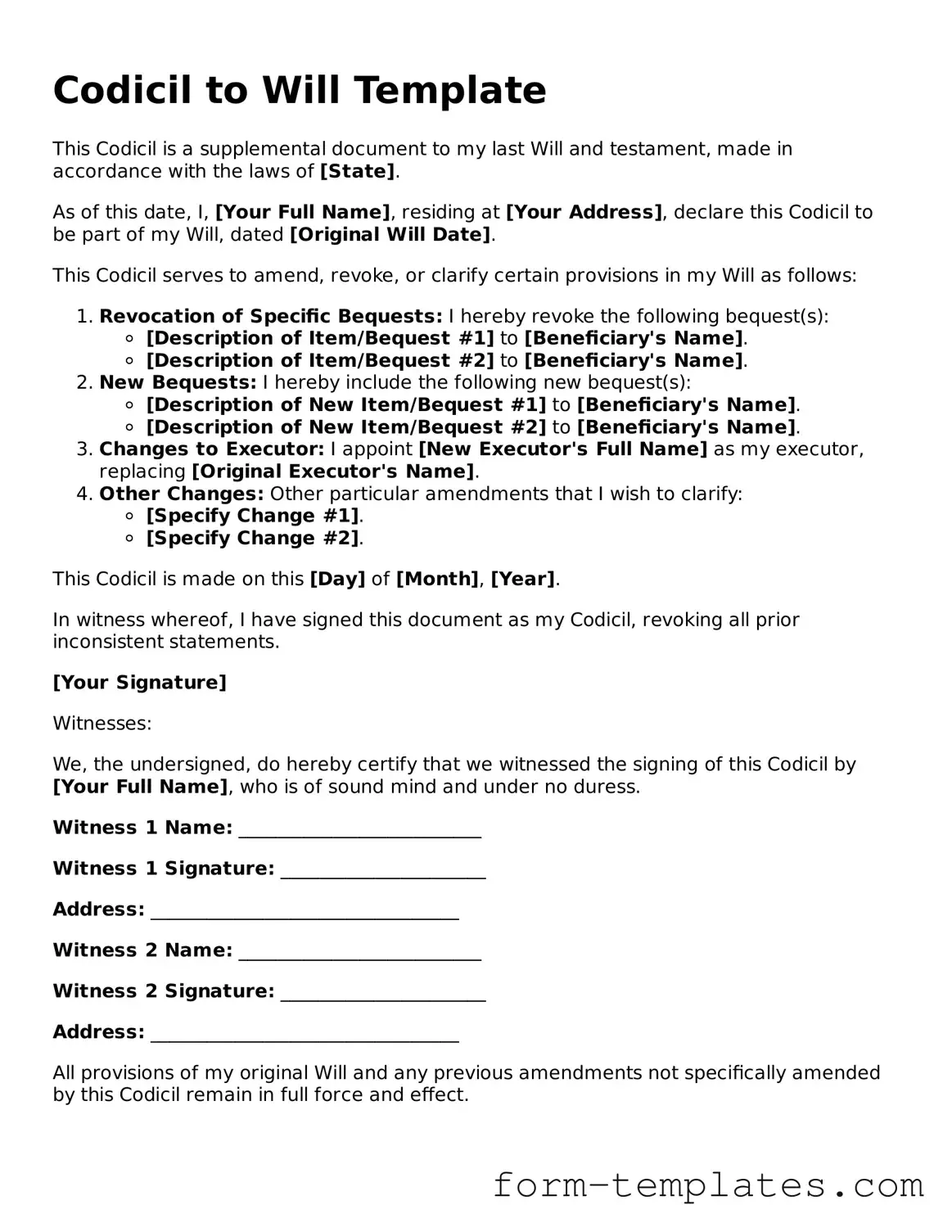Attorney-Approved Codicil to Will Document
Guide to Writing Codicil to Will
After completing the Codicil to Will form, it is essential to ensure that all required signatures and witnesses are in place. This document will need to be stored safely with your original will to ensure that your wishes are honored in the future.
- Begin by writing the date at the top of the form. This establishes when the codicil is effective.
- Clearly state your full name and address. This identifies you as the testator.
- Reference your original will by including the date it was created. This helps to connect the codicil to the existing document.
- Specify the changes you wish to make. Be clear and concise about each alteration or addition.
- Include any specific bequests or changes in beneficiaries, if applicable. Detail what you want to change and to whom it applies.
- Sign the codicil at the bottom of the form. Your signature must match the one on your original will.
- Have at least two witnesses sign the document. They should be present when you sign the codicil.
- Ensure that the witnesses include their names and addresses. This information is necessary for validation.
- Store the completed codicil with your original will in a secure location. This ensures both documents remain together and accessible when needed.
PDF Form Specs
| Fact Name | Description |
|---|---|
| Definition | A codicil is a legal document that modifies an existing will without revoking it. |
| Purpose | Codicils are used to add, remove, or alter provisions in a will. |
| Signature Requirement | Most states require the testator's signature on the codicil for it to be valid. |
| Witnesses | Many states mandate that a codicil be witnessed by at least two individuals. |
| Governing Law | In the U.S., codicils are governed by state law; specific requirements vary by state. |
| Revocation of Previous Wills | A codicil does not revoke a will unless explicitly stated. |
| Durability | Codicils remain valid as long as the original will is valid. |
| Storage | Codicils should be stored with the original will for easy access. |
| Legal Advice | Consulting an attorney is advisable when drafting a codicil to ensure compliance with state laws. |
FAQ
What is a Codicil to a Will?
A codicil is a legal document that allows you to make changes to an existing will without having to rewrite the entire document. It can be used to add new provisions, modify existing ones, or revoke certain parts of the will. This can be particularly useful if your circumstances change, such as a marriage, divorce, or the birth of a child. The codicil must be signed and witnessed, just like a will, to ensure its validity.
How do I create a Codicil to my Will?
Creating a codicil involves several steps:
- Identify the specific changes you want to make to your will.
- Draft the codicil clearly, stating your intentions and referencing the original will.
- Sign the codicil in the presence of witnesses, as required by your state laws.
- Store the codicil with your original will to ensure they are kept together.
It’s advisable to consult with a legal professional to ensure that your codicil is properly drafted and executed.
Can a Codicil revoke a Will?
Yes, a codicil can revoke a will, but it must be explicitly stated within the codicil. If you want to completely revoke your existing will, you may choose to create a new will that includes a clause indicating that all prior wills are revoked. Alternatively, you can simply state in the codicil that the original will is no longer valid. Always make sure that the language used is clear to avoid any confusion in the future.
Is it necessary to have a lawyer to create a Codicil?
While it is not strictly necessary to hire a lawyer to create a codicil, doing so can provide valuable guidance. Legal professionals can help ensure that your codicil complies with state laws and accurately reflects your wishes. If your changes are complex or if your estate involves significant assets, consulting a lawyer is highly recommended. This helps to avoid potential disputes among heirs and ensures that your intentions are honored.
Codicil to Will Example
Codicil to Will Template
This Codicil is a supplemental document to my last Will and testament, made in accordance with the laws of [State].
As of this date, I, [Your Full Name], residing at [Your Address], declare this Codicil to be part of my Will, dated [Original Will Date].
This Codicil serves to amend, revoke, or clarify certain provisions in my Will as follows:
- Revocation of Specific Bequests: I hereby revoke the following bequest(s):
- [Description of Item/Bequest #1] to [Beneficiary's Name].
- [Description of Item/Bequest #2] to [Beneficiary's Name].
- New Bequests: I hereby include the following new bequest(s):
- [Description of New Item/Bequest #1] to [Beneficiary's Name].
- [Description of New Item/Bequest #2] to [Beneficiary's Name].
- Changes to Executor: I appoint [New Executor's Full Name] as my executor, replacing [Original Executor's Name].
- Other Changes: Other particular amendments that I wish to clarify:
- [Specify Change #1].
- [Specify Change #2].
This Codicil is made on this [Day] of [Month], [Year].
In witness whereof, I have signed this document as my Codicil, revoking all prior inconsistent statements.
[Your Signature]
Witnesses:
We, the undersigned, do hereby certify that we witnessed the signing of this Codicil by [Your Full Name], who is of sound mind and under no duress.
Witness 1 Name: __________________________
Witness 1 Signature: ______________________
Address: _________________________________
Witness 2 Name: __________________________
Witness 2 Signature: ______________________
Address: _________________________________
All provisions of my original Will and any previous amendments not specifically amended by this Codicil remain in full force and effect.
